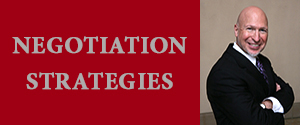

Introduction
A few years ago, while working with the European Union (EU), I was having lunch with several European lawyers in Copenhagen. “Why”, one of them asked me in a thick German accent, “when negotiating deals with Americans, they always come with an army of lawyers and reams of contracts?” (In their countries, lawyers play a very minor role and deals are often still consummated on a handshake).
Thinking quickly on my feet, I responded: “In America, people do business on the basis of not trusting one another, hence armies of lawyers and reams of contracts. When Europeans do business, it is on the basis that you do trust one another and therefore less need for the lawyers and extensive contracts”.
This highlights the cultural differences of whether or not to negotiate with someone we don’t trust. In Europe and Japan for example, establishing trust before negotiating is considered a prudent practice in business. The United States however, with more of a “throw caution to the wind” attitude, and a greater risk tolerance, is less concerned about trust, as long as they do the utmost in mitigating risk with very tight contract language and a strong legal system to enforce any breach.
What happens in a culture that typically builds their negotiations on trust such as the Europeans, and finds they need to negotiate with a partner whom they do not trust?
Read more -->
A few years ago, while working with the European Union (EU), I was having lunch with several European lawyers in Copenhagen. “Why”, one of them asked me in a thick German accent, “when negotiating deals with Americans, they always come with an army of lawyers and reams of contracts?” (In their countries, lawyers play a very minor role and deals are often still consummated on a handshake).
Thinking quickly on my feet, I responded: “In America, people do business on the basis of not trusting one another, hence armies of lawyers and reams of contracts. When Europeans do business, it is on the basis that you do trust one another and therefore less need for the lawyers and extensive contracts”.
This highlights the cultural differences of whether or not to negotiate with someone we don’t trust. In Europe and Japan for example, establishing trust before negotiating is considered a prudent practice in business. The United States however, with more of a “throw caution to the wind” attitude, and a greater risk tolerance, is less concerned about trust, as long as they do the utmost in mitigating risk with very tight contract language and a strong legal system to enforce any breach.
What happens in a culture that typically builds their negotiations on trust such as the Europeans, and finds they need to negotiate with a partner whom they do not trust?
Read more -->